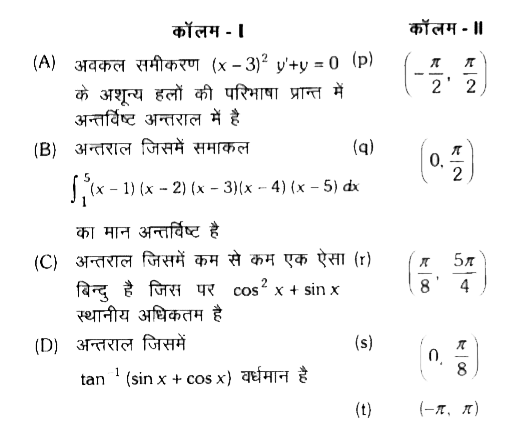यदि , तो =
The correct Answer is:A
Step by step video, text & image solution for यदि y=(sinx)^((sinx)^(sinx.....oo)) , तो (dy)/(dx)= by Maths experts to help you in doubts & scoring excellent marks in Class 12 exams.
Updated on:21/07/2023Topper's Solved these Questions
- अवकलन तथा अवकलज के अनुप्रयोगBOOK - ERRORLESS HINDICHAPTER - अवकलन तथा अवकलज के अनुप्रयोगEXERCISE - MULTIPLE CHOICE QUESTIONS (एक बिन्दु पर अवकलज,मानक अवकलज)
186 Videos
- अवकलन तथा अवकलज के अनुप्रयोगBOOK - ERRORLESS HINDICHAPTER - अवकलन तथा अवकलज के अनुप्रयोगEXERCISE - MULTIPLE CHOICE QUESTIONS (अस्पष्ट फलनों का अवकलन,प्रचलिक व संयुक्त फलनों का अवकलन,लघुगणकीय अवकलन, अनन्त श्रेणियों के अवकलन )
64 Videos
- अवकल समीकरण BOOK - ERRORLESS HINDICHAPTER - अवकल समीकरण EXERCISE - JEE Advanced ( Matrix Match type questions )
3 Videos
- केन्द्रीय प्रवृत्ति के मापBOOK - ERRORLESS HINDICHAPTER - केन्द्रीय प्रवृत्ति के मापEXERCISE - Jee Advanced (Reasoning )
2 Videos
Similar Questions
2f(x)=f'(x) एवं f(0)=3, तब f(2)=
View Solutionमाना y,x2x−2xxcoty−1=0 से परिभाषित x का एक अस्पष्ट फलन है। तब y'(1) बराबर है
View Solution
View Solutionकथन - 1 : प्रथम n सम धन पूर्णांकों का प्रसरण n2−14 है।
कथन - 2 : प्रथम n धन पूर्णाको का योगफल n(n+1)2 और प्रथम n धन पूर्णांको के वर्गों का योगफल n(n+1)(2n+1)6 है।
View SolutionIf y=(sinx)(sinx)(sinx)...∞, prove that dydx=y2cotx(1−ylogsinx).
View SolutionIf y=√sinx+√sinx+√sinx+...∞, then dydx is equal to
View Solutionयदि y=√sinx+cosx+√sinx+cosx+√sinx+cosx+...∞ तो dydx का मान ज्ञात कीजिए ।
View Solutionयदि y=(sinx)(sinx)(sinx)….∞ हो,तो सिद्ध कीजिए कि dydx=y2cotx(1−ylogsinx)
View SolutionIf y=√sinx+√sinx+√sinx+...∞, then the value of dydx is -
View SolutionIf y=(sinx)(sinx)(sinx)....∞show that,
dydx=y2cotx1−ylog(sinx)
View SolutionIf y=2+√sinx+2+√sinx+2+√sinx+…∞ then the value of dydx at x = 0 is
View Solutiondydx का मान ज्ञात कीजिए-
y=(sinx)(sinx)..∞
View Solutionयदि y=√sinx+√sinx+√sinx+…∞ हो तो dydx का मान है
View Solutiony=√sinx+√sinx+√sinx+.....∞ হলে dydx -এর মান হয়—
View Solutiony=(sinx)(sinx)(sinx)⋅⋅⋅∞ হলে দেখাও যে, dydx=y2cotx1−ylog(sinx)
View Solution
